I came across this information in recovery from a formal diagnosis of "major burnout", specifically in addressing a chronic IBS condition. In hindsight it was a bit like playing 'chicken' with the Western medical establishment over a period of years. Symptoms which had manifest as physical ailments were chased downward into a tunnel of ever-more subtle and invisible root causes (physiological, psychosomatic and eventually emotional) before arriving at an inevitable destination that the materiality of Medicine (capital 'M') has trouble acknowledging.
In the years since the valuable insight that I accumulated along the way has been helpful in alleviating a range of people's suffering, and taking the step to contextualise it for broader consumption is long overdue.
You can continue reading to understand a little more about my story and specific experience of this, or skip to the techniques.
Emotional distress and physical consequences
After months of bloodwork and ruling out the usual suspects, at some point I had detailed stool testing done in a specialist lab (to the tune of $500AUD) and my doctors figured out I wasn't producing pancreatic elastase like I should. This means you can't digest proteins or fats very well. Worryingly, low pancreatic function is a sign of cancer. But an MRI (free under an Australian Medicare chronic condition management plan at the time) indicated that things were structurally fine, so the search continued.
I'm being clear and open about the financial costs and state-supported social welfare programs involved because these are rare privileges in 2024. When I say that I attained "valuable insight" I do not just mean that the information was 'good'- it was also expensive and a privilege to come by. Others should be entitled to the same access.
In any case, low pancreatic enzymes can cause different colonies of bacteria in your gut microbiome to get out of whack. Soon one begins to get cramps and gas and bad numbers on the Bristol scale. I ended up being referred to a specialist diagnostician ($750AUD/hr, with $640 of that refunded by Medicare) who traced this back to a chronic stress / trauma condition, which can essentially cause your vagus nerve & parasympathetic nervous system to shut down, and then all your internal organs like your pancreas start misfiring.
"You are under too much stress" was not a satisfying diagnosis with a straightforward solution, but it was the one I was left with.
Addressing such underlying patterns requires many tiny and gentle adjustments to your ingrained habits. If your condition is serious there will likely be other more drastic measures you need to take to reset your system, such as alternating courses of anti- and pro-biotics and intensive diets to reset an imbalanced gut. By no means can I offer any complete or holistic plan toward wellbeing because everyone's holism and condition is different.
This doctor also had some things to say about the work of Navaz Habib and others. Many of the things people talk about for vagus nerve health don't yet have documented medical evidence to support them, but you should also keep in mind that Western science is catching up. In any case, the parasympathetic nervous system care things she did particularly recommend were these:
4-7-8 Breathing
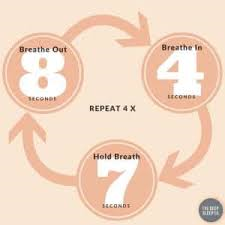
Pretty straightforward. You'll need to purse your lips a bit to get the "out" breath to last for 8 seconds. Then straight back to the "in", no pausing like with the more well-travelled 'box breathing'. You can do it for longer than 4 repeats if you like but expect to be a little short of breath after 4 when you're starting out.
Doing this once in the morning when you wake up and at night before bed can do a surprising amount for your general anxiety. If your condition features IBS then it can be good to do it before eating as well, as it helps to regulate your body into its "rest and digest" state.
Pay Attention to your Food
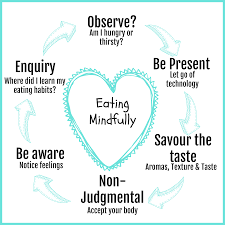
This is also pretty self-explanatory but if you have ever gotten into the habit of scoffing lunch at your desk, then this one is for you. You'll just digest stuff way better if you slow down and chew it properly, duh.
Grounding
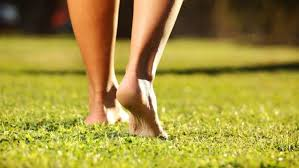
Yep, I am literally just talking about putting your feet in the grass. Hey, not all hippie bullshit is bullshit... like I said, Western science is catching up. 20 minutes of Earth contact a day can make a big difference to your general mental health as well as stress conditions. Even if you literally just have a square foot of dirt lumped at the entryway to your apartment block, it'll do.
If you have the privilege of a beach nearby then walking with your feet in the ocean is even better in terms of the nutrients / microorganisms etc you'll soak up.
Cold Shocks
Contrary to some suggestions, these are proven to have some benefit- but only if you do it routinely. Simply having cold showers or finishing warm ones with a rinse in cold water is an easy way to work it into your routine.
TVNS (Transcutaneous Vagal Nerve Stimulation)
This last one is something you could talk about with your doctor if you feel you're really suffering. If you are in a severe state of low vagal tone they actually used to cut you open and put a pacemaker-like device inside you to deliver periodical low-level electric shocks to your vagus nerve. These days they've figured out the nerve surfaces in your inner ear and so such invasive surgery is totally unnecessary. So now you'll just need a couple of earclip electrodes and an oldschool analogue TENS machine that looks similar to this one:

The reason to get hold of an analogue TENS unit is that the newer digital ones often have a lot of fancy features and presets which don't let you get at the raw settings.
In any case, for vagus nerve stimulation you'll want it set to
- pulse width: 250
- mode: modulated (M)
- pulse rate: 2Hz
- timer: 30min
and interestingly you can also use mostly the same settings but at an 8Hz pulse rate to help in alleviating generalised anxiety. There are actually a bunch of different settings known to do different things- worth looking up if you're curious.
The ear electrodes can be clipped in two ways, depending on what's more comfortable for you:
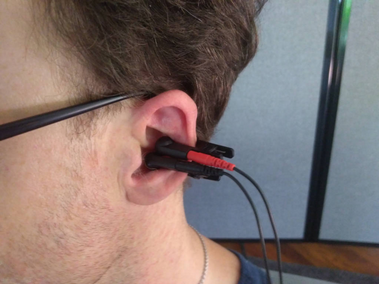
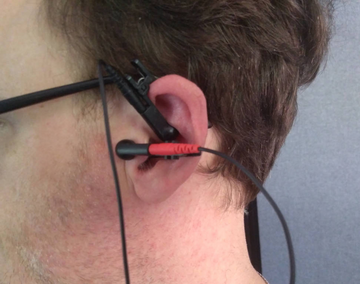
The current should be dialled up until it is just perceptible- it should feel like a pencil being gently tapped against your ear. 30 minutes is a good therapeutic amount of time. You can't really overdo it, except that the earclips hurt a bit. Buying a couple of the soft stick-on pads that hardware stores sell to protect floors from scratching can somewhat alleviate that.